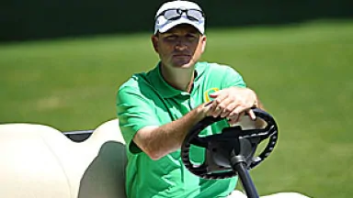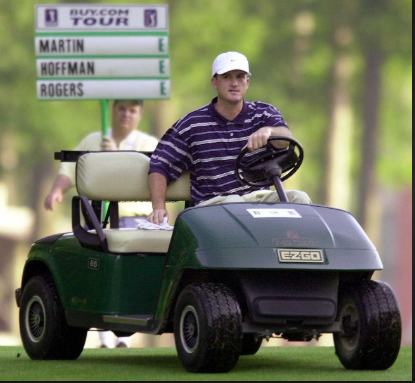
HARTFORD, Conn. – Not to sound morbid or somewhat like a wise guy, but Casey Martin just can’t seem to catch a break these days.
In fact, Martin might lose his right leg after a freak accident while bringing in the garbage at his home in Eugene, Ore.
I first encountered one of the most courageous people in the history of sports in 1998 when he played in the U.S. Open at the Olympic Club in San Francisco thanks to being allowed to use a single-rider golf cart due to a debilitating condition in his leg called Klippel-Trenaunay-Weber Syndrome, a birth defect and incurable medical condition that made walking difficult.
Despite some of golf’s biggest names such as former Stanford teammate Tiger Woods, then-PGA Tour commissioner Tim Finchem, Jack Nicklaus and former Travelers Championship winners Arnold Palmer, Curtis Strange and Paul Azinger saying walking was part of the sanctity of the game, Martin won the PGA Tour, Inc. v. Martin case in the Supreme Court in 2001 under the Americans with Disabilities Act. During the years that the suit wound through the courts, he enjoyed limited success on the course while being permitted to use a golf cart and winning over just about every person he met with his intelligence, toughness and enthusiastic commitment.
Martin, now the men’s golf coach at the University of Oregon, his alma mater, had graduated from Stanford, where he played with Woods and 2000 Canon Greater Hartford Open winner Notah Begay III and was a member of the 1994 NCAA Division I Championship team. Martin had won the 1993 Sahalee Players Championship, turned pro in 1995 and captured the 1998 Nike (now Korn Ferry) Tour’s Lakeland Classic in a playoff, assuring he would remain on the PGA Tour and secure a five-year exemption from the first round of the qualifying school.
At the 1998 U.S. Open, Martin was put in the penultimate threesome in the first round, teeing off at 6:33 p.m. Eastern time and finishing just before midnight. I’ve always contended the U.S. Golf Association assigned him that late time so media attention would be minimized. The USGA could have given him an early time on Thursday and a later time on Friday, but the first round was the most important news-wise.
Still, Martin took the high road during his pre-tournament press conference when asked about his lawsuit against the PGA Tour.
“There certainly have been negative stories, or there’s controversy, and there’s two sides to every story,” Martin said. “But I try not to focus on it too much, and I don’t take it personally. I realize there is another side to my story and people can certainly, we can agree to disagree. So I’ve really – I try to not major in that and try to just feel fortunate that there’s a lot of people that are pulling for me. I get a lot of support out there from the galleries and trying to enjoy that.”

Because of deadline issues while writing for The Hartford Courant, I had to file an early-edition story by 10:30 p.m., which was while Martin was still playing the back nine. So to give me a lead for the early editions, I decided to talk to Martin’s parents about his plight and fight in life and their pride. I’ll never forget sitting with the couple in the bleachers behind the first tee with tears welling in their eyes as their son got a rousing ovation as he walked to the tee before hitting his first shot. The three of us then walked the front nine together before I thanked them for their time and tales and adjourned to the press room to compose my early story.
Martin shot a 4-over-par 74 but didn’t get to the press room to discuss his round and feelings until 12:15 a.m. on Friday morning on the East Coast. That was far past deadlines for many editions of many papers throughout the world, not to mention late-night television news shows. As I wrote my story, I was fuming about how shabbily the USGA had treated Martin in an apparent protest to him being allowed to use a cart, which definitely was the correct and humanitarian thing to do. By the time I filed my updated story, it was 1 a.m., and it missed four of our six editions.
Well, I felt plenty different as the second round played out and unashamedly smiled as Martin finished off a 71 to make the cut. He went on to shoot 74-72 and finish in a six-way tie for 23rd that included Woods, Colin Montgomerie and Jose Maria Olazabel, putting an emphatic up-yours to the USGA. Being as classy as he was, Martin never mentioned the USGA’s pathetic treatment and headed off into the Sunday sunset exuding plenty of pride for what he had been able to accomplish under such trying conditions.
Two weeks later, Martin received his first sponsors’ exemption and brought his game and class to TPC River Highlands in Cromwell, where he shot 4-over 144 for 36 holes and missed the cut by five strokes in the Canon Greater Hartford Open, now Travelers Championship. Still, he was heartily cheered by the Connecticut fans and spent lots of time signing autographs in appreciation.
Sadly, Martin’s debilitating condition led to him losing his PGA and Nike Tour cards several times before retiring from competitive golf in 2006 after making the cut in only one of five starts, earning $1,328. In May of that year, Martin was named the golf coach at Oregon, located in his hometown after working as a volunteer assistant the previous season. He indicated he hoped to continue to play, when it fit into his coaching schedule, but he didn’t play any pro events or attempt qualifying school in 2007 or 2008. He did qualify for the 2012 U.S. Open and then coached the Ducks to the 2016 NCAA Division I Championship that he had won as a player 12 years earlier. Some of his standout recruits have been PGA Tour players Wyndham Clark and Aaron Wise, the 2018 Rookie of the Year who was the individual champion when the Ducks won the national title.
Unfortunately, misfortune felled Martin again when he stepped off a curb and fractured the tibia in his injured right leg.
“Pain has been a common thread in my life, but not like this,” Martin told GolfChannel.
Martin was injured while bringing in his garbage can and stepping awkwardly on a road that was under construction. Martin’s foot slipped, and he landed awkwardly, fracturing his leg. He was hospitalized for a few days and then spent a few weeks on bed rest at home, unable to complete basic tasks around the house. He’s now in a cast and on crutches, but he’s scheduled to visit the doctor on Wednesday to see how the leg is healing, with his circulatory disorder complicating his recovery.
“I’ve lived with this fear all my life that if I break it, I’m probably going to lose,” Martin said. “If it’s healing, then it’s a long process for me, probably longer than most. But if it’s not healing well, then we’re going to have to look at other options.”
Martin said his fear of breaking his leg was one of the reasons that he sued the PGA Tour for the right to ride in a cart when he played in tournaments.
“I worried that if I stepped in a hole, I could break my left,” Martin said, “and we don’t want that to happen.”
Martin said he experiences jolts of intense pain with any touching or twisting, describing the injury as “the most painful thing I’ve ever dealt with.”
“At 47, I’m kind of shocked because I’ve lived with that fear for a long time,” Martin said. “I’m grateful it wasn’t a full break, but I’ve got a long road ahead.”
Hopefully, Martin has a successful recovery that’s as pain-free as possible. Perhaps Martin should talk to Danbury native Ken Green, who has lived for more than 10 years without the lower part of his right leg that was amputated after a horrific recreational vehicle accident that caused the death of his wife, brother and dog while he was playing the PGA Tour Champions. Green, 61, still plays a limited schedule, including two events in Connecticut, while riding in a cart and recently wrote a compelling book with an in-depth look at a life that has included the accident, depression, divorces, lawsuits and sexual abuse while a teenager growing up in Honduras.
Martin and Green are two gritty players and people doing their inspiring best to show others that perseverance is one of mankind’s greatest traits.











Leave a Reply